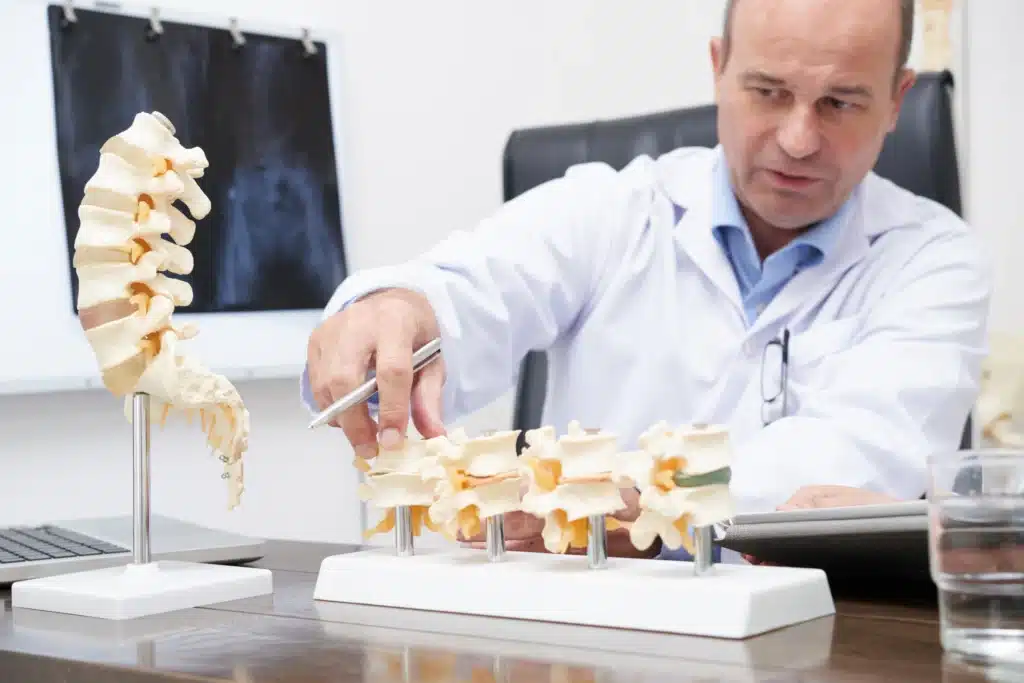
Table of Contents
ToggleSpine surgery disc replacement is an advanced procedure designed to replace damaged spinal discs with artificial ones. As a spine surgeon with over 25 years of experience at Long Island Neuroscience Specialists, I’ve seen firsthand the transformative effects of this surgery.
This comprehensive guide will cover everything you need to know about spine surgery disc replacement, from candidacy to recovery, ensuring you have all the information to make an informed decision about your spinal health.
Spine surgery disc replacement involves the removal of a damaged spinal disc and its replacement with an artificial one. This surgery is performed on the lumbar or cervical spine and aims to preserve the natural motion of the spine.
Unlike spinal fusion, which permanently joins two vertebrae, disc replacement maintains spinal flexibility. This advanced procedure has evolved significantly over the years, offering patients a viable alternative to traditional fusion surgeries.
Determining whether you’re a good candidate for spine surgery disc replacement involves several factors. Generally, candidates should be in good overall health and not excessively overweight. The primary condition treated is degenerative disc disease, often accompanied by symptoms like chronic back pain or radiculopathy.
Patients with good disc height and minimal arthritis are ideal candidates. Prior spinal surgeries or severe spinal deformities, such as scoliosis, may disqualify you from this procedure. Comprehensive evaluations, including MRI and CT scans, help in assessing your suitability for the surgery.

One of the primary benefits of spine surgery disc replacement is the preservation of natural spinal motion. This procedure reduces the risk of adjacent segment disease, a common issue with spinal fusion, where adjacent discs deteriorate due to increased stress.
Recovery times are generally shorter with disc replacement, allowing patients to resume normal activities more quickly. Additionally, this surgery often results in better pain relief and overall quality of life compared to traditional fusion.
The ability to maintain spinal flexibility makes disc replacement a preferred choice for many patients.
The procedure for spine surgery disc replacement varies slightly depending on whether the lumbar or cervical spine is involved. For lumbar disc replacement, the surgery is performed through an incision in the abdomen, allowing the surgeon to access the spine without disturbing the spinal nerves.
The damaged disc is removed, and an artificial disc is implanted. In cervical disc replacement, the incision is made in the front of the neck. The surgery typically takes about two hours and involves a team of surgeons, including a vascular or abdominal surgeon and a spine specialist.
Precise placement of the artificial disc is confirmed using imaging techniques.
As with any surgery, spine surgery disc replacement carries certain risks. General surgical risks include infection, blood clots, and anesthesia complications. Specific risks related to disc replacement involve implant dislocation, failure, or wear.
There’s also the potential for nerve damage or injury to surrounding organs. However, with proper surgical technique and postoperative care, these risks are manageable. Discussing potential risks and benefits with your surgeon is crucial to understanding the procedure’s implications fully.
Recovery from spine surgery disc replacement typically involves a hospital stay of one to two days. Pain management is a priority, and patients are encouraged to stand and walk as soon as possible. Rehabilitation and physical therapy play a critical role in recovery, helping to restore strength and flexibility.
Activity restrictions, such as avoiding heavy lifting or high-impact sports, are essential for the first few months. Following the surgeon’s guidelines on exercises and movements can significantly improve the recovery process and outcomes.
The full recovery timeline for spine surgery disc replacement can vary but generally spans several months. Initially, patients focus on pain management and gentle movements. Within a few weeks, more rigorous physical therapy may begin.
By three months, most patients can resume normal activities, though high-impact activities might still be restricted. Regular follow-up appointments with your surgeon ensure that recovery is on track and that any complications are addressed promptly.

The success rate for spine surgery disc replacement is high, with many patients experiencing significant pain relief and improved mobility. Long-term studies have shown favorable outcomes, particularly when compared to spinal fusion.
Success rates depend on various factors, including the patient’s overall health, the surgeon’s expertise, and adherence to postoperative care guidelines. Most patients report high satisfaction levels and a marked improvement in their quality of life post-surgery.
While spine surgery disc replacement allows for a return to normal activities, certain long-term considerations remain. Patients are advised to avoid high-impact sports and activities that may strain the spine.
Regular exercise, maintaining a healthy weight, and avoiding smoking can help sustain the surgery’s benefits. Ongoing monitoring and periodic imaging tests may be necessary to ensure the artificial disc remains in good condition and to detect any potential issues early.
Preparation for spine surgery disc replacement involves several steps. Patients undergo comprehensive evaluations, including imaging tests and possibly nerve conduction studies. Lifestyle adjustments, such as quitting smoking and managing weight, are crucial.
Discussing all medications with your healthcare provider is essential, as some may need to be discontinued before surgery. Understanding the procedure, its risks, and benefits is vital, and having a support system in place for postoperative care can aid in a smoother recovery.

Symptoms indicating the need for spine surgery disc replacement often include chronic back pain, radiating pain in the limbs, and numbness or tingling due to nerve compression. These symptoms typically persist despite conservative treatments like physical therapy and medications.
Imaging tests revealing significant disc degeneration or herniation also support the need for surgery. If these symptoms impact daily activities and overall quality of life, disc replacement surgery may be a suitable option.
Spine surgery disc replacement significantly improves the overall quality of life for many patients. Pain reduction and enhanced mobility allow for a return to daily activities and hobbies. The psychological benefits of reduced pain and increased functionality are also notable.
Patient testimonials often highlight a substantial improvement in well-being and satisfaction post-surgery. These positive outcomes reinforce the value of disc replacement as a viable treatment option for chronic back issues.
Before undergoing spine surgery disc replacement, it’s essential to ask your surgeon several key questions. Inquire about their experience and success rates with this procedure, as well as the specifics of your surgery, including duration and recovery expectations.
Understanding the potential risks and how they are managed is crucial. Additionally, ask about postoperative care, follow-up plans, and any alternative treatments that may be available. This thorough discussion helps ensure you are well-prepared and confident in your decision.
The costs of spine surgery disc replacement can vary widely based on factors such as location, surgeon expertise, and hospital fees. It’s important to obtain a detailed cost breakdown, including preoperative evaluations, surgery, and postoperative care.
Many insurance plans cover disc replacement surgery, but pre-authorization is often required. Discussing financial assistance options and payment plans with your healthcare provider can help manage the expenses.
Comparing these costs with those of spinal fusion surgery can provide additional context for your decision. To know more about cost for Disc Replacement Click Here
Selecting the best spine surgeon for your disc replacement surgery involves careful research. Look for qualifications such as board certifications and specific experience with disc replacements.
Hospital and surgical center reputations are also important indicators of quality care. Patient reviews and testimonials can provide insights into others’ experiences. Scheduling a consultation allows you to discuss your case in detail and evaluate the surgeon’s approach and expertise.
At Long Island Neuroscience Specialists, we pride ourselves on our extensive experience and patient-centered care.
GET IN TOUCH +
285 Sills Road
Building 5-6, Suite E
East Patchogue, NY 11772
(631) 475-5511
184 N. Belle Mead Road
East Setauket, NY 11733
(631) 675-6226
GET IN TOUCH +
285 Sills Road
Building 5-6, Suite E
East Patchogue, NY 11772
(631) 475-5511
184 N. Belle Mead Road
East Setauket, NY 11733
(631) 675-6226
SUBSCRIBE TO OUR NEWSLETTER +
Send us a Google review. Click this link and let us know how we did!
Review us on Yelp too.